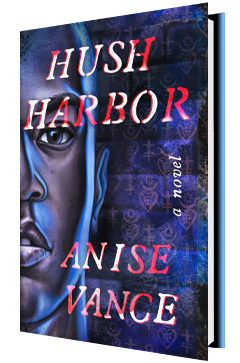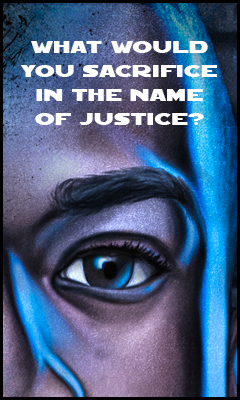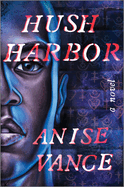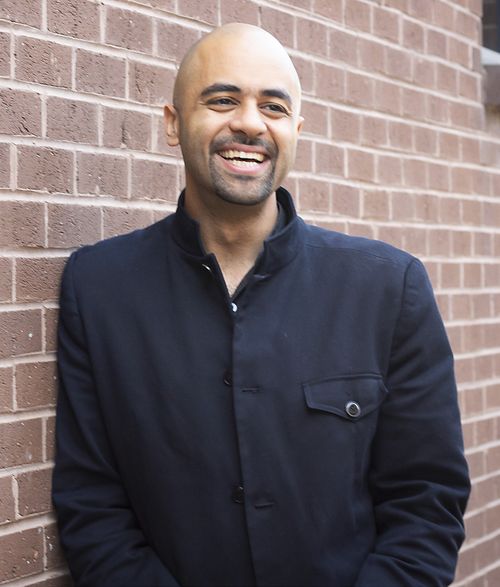Hush Harbor
by Anise Vance
Anise Vance's powerful debut, Hush Harbor, is a thought-provoking and pulse-pounding novel of an alternative present that imagines an attempt to craft a new society in the wake of the U.S.'s racial reckoning. It stands out for its ability to be, in equal parts, a sensitive, insightful thought experiment and a roller-coaster ride of action-thriller set pieces.
When an unarmed Black teenager, Kemba Jefferson, is murdered by two police officers, protests begin across the country. But in Bliss City, N. J., one resistance group, led by the brilliant and charming Prince siblings, Nova and Jeremiah, isn't interested in another series of protests that go nowhere. This time, they want real change. Members of the collective barricade themselves in an abandoned housing project, where they declare war against white supremacy and start to create the foundation for a new society. They name this community after the secret places enslaved people would go to pray: Hush Harbor.
But all is not going smoothly for the movement when young, educated, angry, and idealistic Malik is brought into the fold by his old college mentor to be an assistant to Jeremiah. The police are shooting anyone who tries to enter or exit Hush Harbor, forcing the collective and their goods to come and go through a network of tunnels beneath the city streets. While Malik introduces readers to the burgeoning society of Hush Harbor, Nova's once best friend Quinn embeds readers in the political upheaval that defines the city surrounding the new collective. Bliss City’s first Black mayor in decades--for whom Quinn works--is on the brink of being ousted by groups who are determined to install a militant leader with white supremacist connections, a man eager to destroy the collective by any means possible. When Quinn delivers news of this imminent threat to Nova and Jeremiah, the siblings disagree as to which path forward--one based on preemptive attack versus one based on defense and protection--is the true meaning of resistance.
From page one, the world of Hush Harbor is both nightmarish and eerily familiar. As Malik slips through one checkpoint after another on his way to the Hush Harbor settlement, readers are shuttled into an atmosphere of dueling tension and excitement, paranoia and hope. Vance's attention to atmospheric and emotional detail make the movement seem wonderfully, terrifyingly possible. During one near-death encounter, Malik feels his heart hammering: "The engine's buzz beat against his eardrum... [as he] pressed himself against the earth, sensing the light skim the crown of his head." Even Vance's most adrenaline-charged scenes are attuned to the particularities of a character and their history. In the case of this scene, he uses such moments as opportunities to illuminate character revelations, like Malik's fear and growing suspicion that what his grandfather had always told him has been right all along, and that staying under the radar is their best option. The novel's fast pace keeps the plot rolling as it unravels, layer by layer, the secrets held by each of the four point-of-view characters: Malik, Quinn, Jeremiah, and Nova.
But perhaps an even bigger reason behind the world's uncanny credibility is Vance's eye for logistics. Hush Harbor is more than a thrilling dystopian landscape--it's a fully functioning town, home to men, women, and children of all ages, one with its own daily routines, adapted modes of functioning, and developing culture, like the way Hush Harbor transforms on market days. Malik describes it as a "spectacle" of "logistical complexity": "On market day, tables lined the central courtyard and sweaty shoulders jammed against each other. Items were bartered without currency. A homemade chocolate bar for prayer beads. Two rolls of toilet paper for a half of a jar of shea butter." Rather than appearing as some half-baked scheme or a cliché vision of revolution, Vance's resistance collective realistically grapples with quotidian matters.
This realization of the everyday challenges that face the movement's leaders may not surprise only readers; it seems to surprise Nova, Jeremiah, and others as well. A central emotional conflict for these characters becomes how to navigate their own movement's direction, once it has become a society and not just a group of revolutionaries willing to risk all. Vance excels at making space for these quiet moments of reflection, such as when he depicts Nova and Jeremiah discussing Hush Harbor's central mural or when he describes the "focused... cadence" of a run. These scenes, like the activities they describe, serve as openings that allow for transcendent thoughts and imaginings. What kind of world could this be? And how can a collection of people expect to achieve it? The answer, as in a mind-clearing run, seems to be to keep going, no matter what.
Many of the novel's key showdowns--between Nova and Jeremiah, between Jeremiah and one of the officers who shot Kemba--subvert readers' expectations of what such a confrontation might be in a world like this. They often aren't the physically violent clashes one might imagine (until they are forced to be). Vance's ability to balance action and quietude in this masterful first novel mirrors the thematic balance he strikes between the dueling impulses of violence and peace in such movements. Ultimately, this story demonstrates an awareness of just how important and powerful it can be to sustain peaceful and collaborative efforts in the face of a world bent on perpetual argument and acts of dominance. An emotional, conceptual, page-turning tour-de-force, Hush Harbor disrupts readers' expectations of violence, of revolutions, and of truly revolutionary leaders. --Alice Martin








